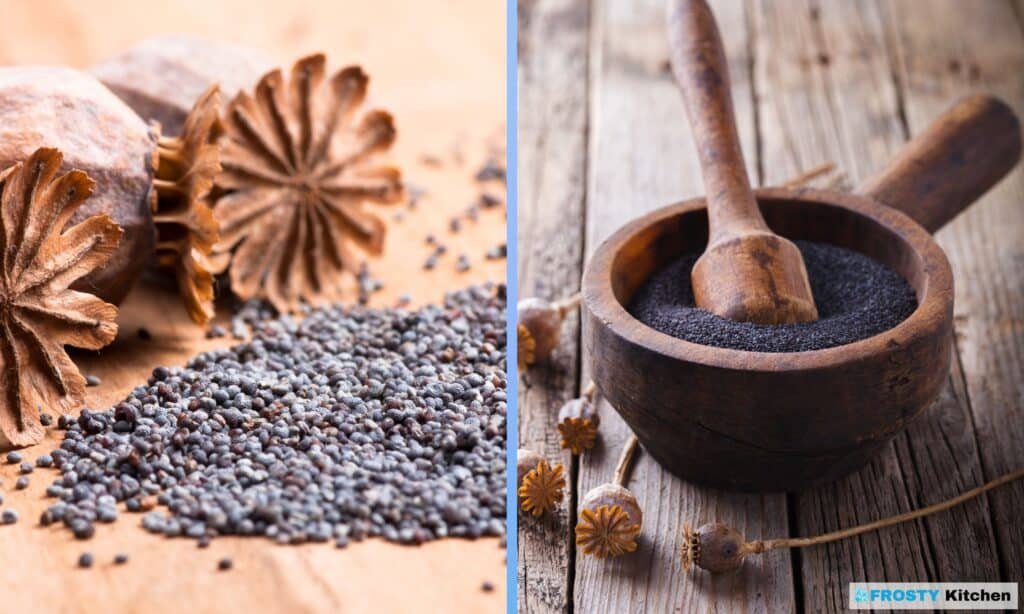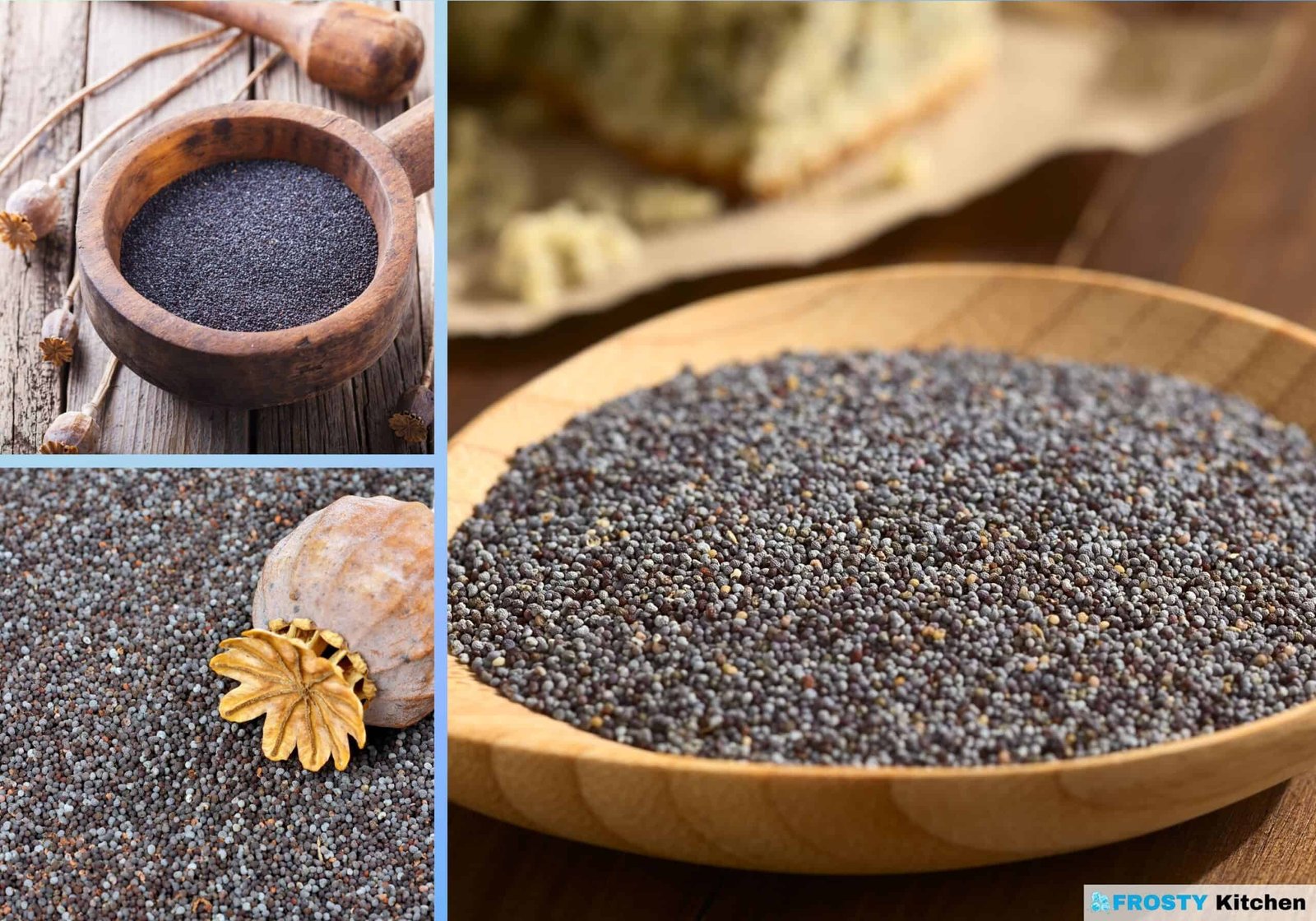Venturing into the realms of culinary creativity, the importance of retaining the essence of each ingredient becomes paramount, and among them, Edible Poppy Seeds have a significant place. Their unique nutty flavor and pleasant crunch make them a cherished element in many regional cuisines. This guide explores the nuances of storing Edible Poppy Seeds, ensuring they remain fresh and nutritionally rich for your kitchen exploits whenever inspiration strikes.
What are Edible Poppy Seeds?
Edible Poppy Seeds, derived from the poppy plant (Papaver somniferum), have been a notable ingredient in culinary traditions across the globe. They are known by various names such as Khas Khas in India and Maw Seeds in the UK. Similar to sesame seeds in appearance but unique in taste and texture, Poppy Seeds are known for their nutty flavor and crunchy texture.
They are a popular component in various culinary traditions, notably in Indian, Middle Eastern, and Central European cuisines, where they grace many savory and sweet dishes. The appeal of Edible Poppy Seeds isn’t confined to their taste alone but extends to their nutritional profile, which includes essential fatty acids, minerals, and vitamins.
Origin and History
The history of Edible Poppy Seeds dates back to ancient civilizations, where they were used both as a food ingredient and for medicinal purposes. Initially, they found prominence in Mesopotamia and later spread across the Mediterranean region and Europe, becoming a cherished ingredient in various cuisines.
In Central Europe, Poppy Seeds have been traditionally used in pastries and desserts, while in India and the Middle East, they are often utilized in savory dishes. The widespread use of Poppy Seeds over time showcases its enduring appeal and the versatile flavors it brings to various culinary creations.
Nutritional Value
Edible Poppy Seeds are a nutritional treasure trove. They are rich in essential fatty acids, particularly omega-6 fatty acids, which are known for promoting heart health. Moreover, they contain a good amount of minerals like calcium, phosphorus, and iron.
- Heart Health: Omega-6 fatty acids in Poppy Seeds can contribute to heart health by reducing bad cholesterol levels.
- Bone Health: The calcium and phosphorus content supports bone health.
- Iron Absorption: Iron present in Poppy Seeds is essential for preventing anemia and promoting healthy blood circulation.
Each of these health benefits contributes to the overall well-being, making Edible Poppy Seeds a valuable addition to a balanced diet. Furthermore, the nutritional value of Poppy Seeds can aid in managing various health conditions when included as part of a balanced diet.

Importance of Proper Storage for Edible Poppy Seeds
Proper storage of Edible Poppy Seeds is instrumental in preserving their freshness, and nutritional value, and extending their lifespan. Without proper storage, they can quickly lose their aromatic essence and nutritional potency.
General Lifespan and Preservation
Edible Poppy Seeds have a general shelf life of 6 to 12 months when stored correctly. By ensuring a controlled environment with cool, dark, and dry conditions, the lifespan of Poppy Seeds can be significantly extended, keeping them ready for culinary use.
Factors Affecting the Lifespan of Edible Poppy Seeds
Several factors can affect the lifespan of Edible Poppy Seeds. Understanding these factors can help ensure that they remain fresh and safe to consume.
Temperature
Temperature plays a crucial role in preserving the freshness and nutritional value of Poppy Seeds. A cool, dry place away from direct sunlight is ideal for storage.
Exposure to Light
Exposure to light can accelerate the degradation of Edible Poppy Seeds, leading to loss of nutritional value and potential rancidity. It’s advisable to store them in a dark place or in opaque, airtight containers.
Moisture Content
Moisture can lead to mold growth and spoilage in Poppy Seeds. It’s crucial to keep them in a dry environment to ensure their longevity.
Packaging
Proper packaging is essential to prevent exposure to external factors that could degrade the quality of Poppy Seeds. Airtight containers or vacuum-sealed bags are ideal choices for preserving quality.
Air Quality
The quality of air, especially its oxygen content, can affect the rate at which Poppy Seeds go rancid. Vacuum sealing or using oxygen absorbers can help prolong their freshness.
Signs of Spoiled Edible Poppy Seeds
Identifying spoilage in Edible Poppy Seeds is crucial to ensure safety and quality.
Odor
A rancid or off-putting smell is a clear indication of spoilage in Edible Poppy Seeds. Fresh seeds have a mild, nutty aroma.
Texture and Appearance
Changes in texture or appearance, like clumping or discoloration, are signs of spoilage or mold growth.
Preparation for Storage
The preparation phase is vital in ensuring the longevity and preservation of Edible Poppy Seeds.
Cleaning
Ensuring that Edible Poppy Seeds are clean and free from debris before storage is essential.
Preparing
Choosing high-quality, unspoiled Poppy Seeds for storage is critical. Discard any seeds that look discolored, moldy, or have an off smell.
Picking the Right Packaging/Container
Choosing the right packaging or container is essential for preserving the quality of Edible Poppy Seeds. Airtight containers made of glass or BPA-free plastic are ideal choices.
Recommended Types of Containers for Storage
Glass jars with airtight lids, vacuum-sealed bags, or BPA-free plastic containers are excellent choices for storing Edible Poppy Seeds. They protect the seeds from air, light, and moisture, ensuring they remain fresh for a longer time.
Step-by-Step Guide to Storing Edible Poppy Seeds
Method 1: Dry Storage
- Step 1: Ensure the Edible Poppy Seeds are clean and dry.
- Step 2: Transfer the seeds into an airtight container.
- Step 3: Store in a cool, dark, and dry place.
Method 2: Freezer Storage
- Step 1: Ensure the Edible Poppy Seeds are clean and dry.
- Step 2: Transfer the seeds into a vacuum-sealed bag or airtight container.
- Step 3: Store in the freezer.
Frequently Asked Questions
Q1: Can Edible Poppy Seeds go bad?
Yes, like other seeds, Edible Poppy Seeds can go bad if not stored properly. They have a natural oil content that can turn rancid over time, especially when exposed to air, light, or high temperatures.
Q2: How can I extend the shelf life of Edible Poppy Seeds?
To extend the shelf life of Edible Poppy Seeds, keep them in a cool, dark, and dry place. Using airtight containers or vacuum-sealed bags can significantly prolong their freshness and nutritional potency.
Q3: Are there any special considerations for storing Edible Poppy Seeds in humid climates?
In humid climates, it’s especially important to keep Edible Poppy Seeds in airtight containers to prevent moisture exposure which can lead to spoilage. Storing in a cool and dry place, or even in the refrigerator or freezer, can also be beneficial.

